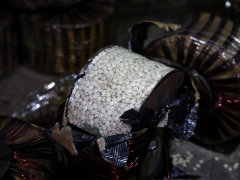Following its ousting of the government of Bashar al-Assad in Syria last week, the opposition alliance led by Hayat Tahrir al-Sham (HTS) invited international reporters to witness vast stockpiles and clandestine factories of the illicit drug Captagon.
Over the past decade, the al-Assad government has been accused of being the principal purveyor of Captagon, a highly addictive, amphetamine-like pill popular in wealthy Gulf countries, including Saudi Arabia.
The profits propped up state finances, battered by sanctions and war, to the point that Syria has been described as a “narco-state”.
Led by Ahmed al-Sharaa, previously known as Abu Mohammed al-Julani, HTS and Syria’s new administration appear determined to make it clear they do not approve of Syria’s drug trade.
“HTS and Julani thus far have sought to put distance between this new transitional government and the Captagon trade,” Caroline Rose, an expert on Syrian drug trafficking at the New Lines Institute, told Al Jazeera.
“This is why we’ve seen several laboratory and warehouse raids on regime-aligned facilities as well as Julani referring to the regime’s illicit history of Captagon production. They may not be able to rein in all low-scale production and cross-border trafficking, but there will be a strategy to crack down on industrial-scale production and encourage Syrians to participate in the formal, licit economy.”
With al-Assad gone, what happens to the Captagon business now?

What is the history of Captagon production?
Captagon was the brand name for fenethylline, originally developed by German pharmaceutical firm Degussa in the 1960s to treat narcolepsy and attention-deficit/hyperactivity disorder (ADHD).
Its circulation was restricted by the United Nations in 1986 because of its undesirable side effects, including anxiety and depression, and its addictive potential, although certain medical uses are still allowed.
By then, however, Captagon had already picked up a following as a recreational drug in the Middle East, as it also leaves users feeling confident and alert along with a sensation of euphoria.
During the Cold War, communist Bulgaria was the centre of Captagon production.
Bulgaria’s powerful secret service, the DS (Committee for State Security), had a sideline in smuggling via the state-owned import-export company Kintex: running guns to African war zones, heroin into Europe and Captagon to the Middle East.
Captagon initially survived communism’s eventual collapse as out-of-work spies muscled in on the criminal underworld.
But Bulgarian authorities finally dismantled the fenethylline factories in the early 2000s as the country joined the European Union, and manufacturing migrated from the Balkans to the Middle East.
How did Captagon production take off in Syria?
Once home to an established pharmaceuticals industry, Syria became the world’s largest producer of Captagon.
Unrest against al-Assad, whose family ruled since seizing power in a coup d’etat in 1970, descended into a bloodbath in 2011, with armed groups taking territory.
At first, it was some armed groups cooking Captagon but, as the government clawed back territory with the aid of its allies, it also took control of smuggling routes and production facilities.
According to customs officers, shipments have been disguised as rubber tyres, steel cogwheels, industrial paper rolls, sofas or even plastic fruit, routed through Europe and Africa to disguise their origin before reaching the Gulf.
The value of intercepted shipments was estimated at $5.7bn in 2021, several times greater than Syria’s legitimate exports, worth a mere $860m in 2020.
Captagon became Syria’s most valuable export, providing billions in profit for “regime-aligned networks and individuals … either within the leadership of the re





